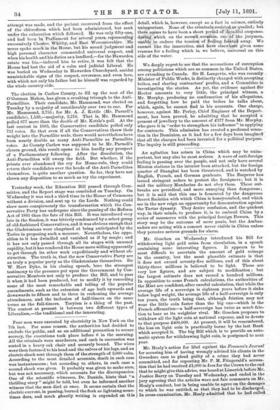Yesterday week, the Education Bill passed through Com- mittee, and
the Report stage was concluded on Tuesday. On Wednesday it was read a third time in the House of Commons without a division, and sent up to the Lords. Nothing could show more conspicuously the transformation which the Con- servative Party has undergone since the passing of the Reform Act of 1885 than the fate of this Bill. It was introduced very late in the Session, it was bitterly condemned by a select group of old-fashioned Conservatives, and it was obvious enough that the Gladstonians were chagrined at being anticipated by the Tories in proposing such a measure. Nevertheless, the oppo- sition to it has dwindled and vanished as if by magic ; and it has not only passed through all its stages with unusual rapidity, but it has rendered the House more willing apparently to get through its other work expeditiously and without ob- struction. The truth is, that the new Conservative Party are as truly a popular party as the Gla.dstonians themselves. Sir W. Hart Dyke, in his closing speech, bore the strongest testimony to the pressure put upon the Government by Con- servative Members not only to produce the Bill, and to pass it when it had been produced, but to modify it by conceding some of the most remarkable and telling of the popular amendments, such as the extension of age both upwards and downwards to fifteen and to three in reckoning the average attendances, and the inclusion of half-timers on the same terms as the full-timers. Toryism is a thing of the past. The contest at present is between two different types of Liberalism,—the traditional and the innovating.


































 Previous page
Previous page